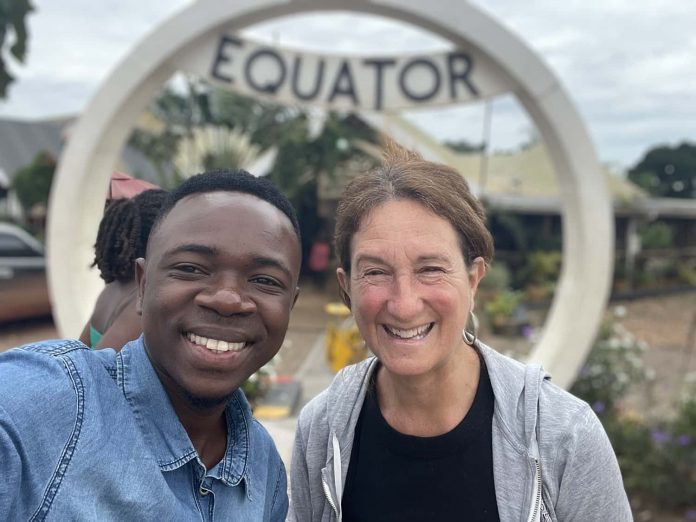By Jean Breny, professor of public health
Nestled in the heart of East Africa, Uganda, is a country that offers a tapestry of experiences that will leave any traveler in awe. Known as the “Pearl of Africa,” this enchanting destination boasts a stunning blend of diverse landscapes, wildlife, and vibrant cultures.
I was fortunate enough to visit Uganda in the spring, 2023 semester while on sabbatical. My goal was two-fold: 1) to offer a workshop with my book co-author, Dr. Shannon McMorrow, on Photovoice research to students and faculty in the School of Public Health at Makarare University in Kampala; and 2) to explore as much of the country that I could in the 10 days that I would be there.
My adventure began as I touched down at Entebbe International Airport. The warm tropical breeze and welcoming smiles of the Ugandan people make for a delightful first impression. After finding Shannon in the crowd, we drove to her apartment in the capital city, Kampala, and I settled in.
Over the next couple of days, we explored Kampala, Uganda’s bustling capital. It is a city of contrasts where modern skyscrapers coexist with vibrant markets and historical sites. Then, we explore the chaotic beauty of Owino Market, known for its colorful fabrics and bustling atmosphere as well as the Taxi Park, which is a site to see.
Our workshop on Photovoice was amazing, attended by over 40 people in person and 25 online, we spent a few hours lecturing, discussing, and then sharing informal conversations with participants as we wound down.
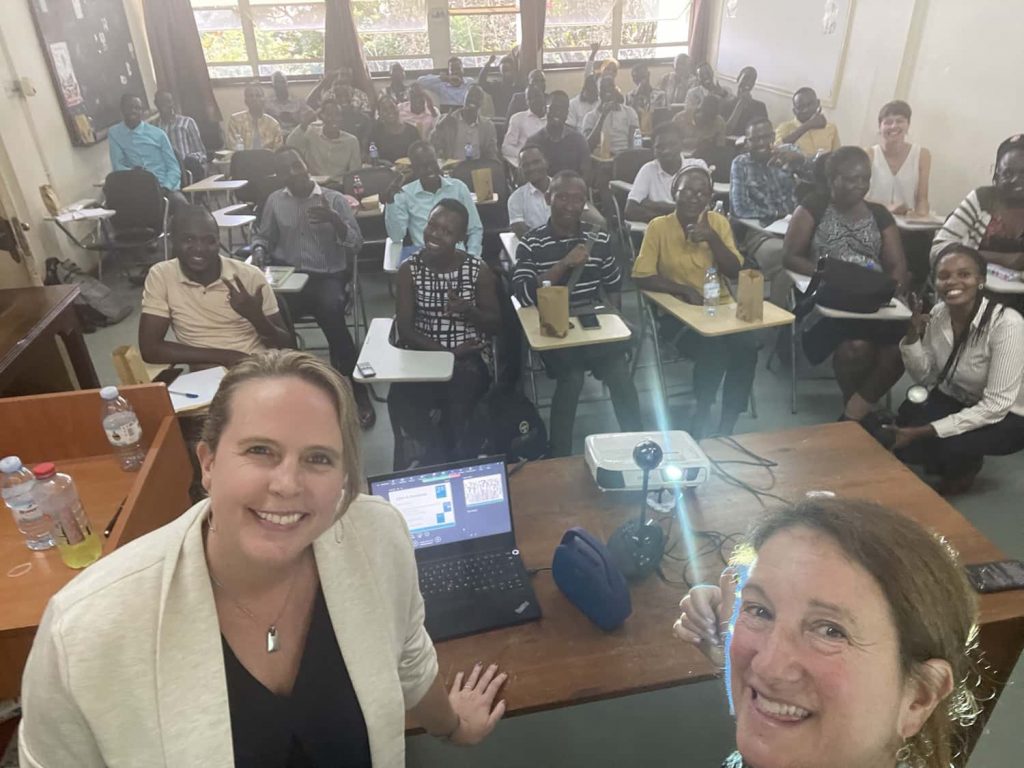
We then left Kampala to explore the western part of the country for five days, including a first stop at the equator. Next we drove to Queen Elizabeth National Park for two nights, staying at a very humble but wonderfully staffed lodge. We went on two game drives in Queen Elizabeth National Park, where upon seeing my first elephant, I broke down in tears! Never have I ever witnessed such incredible beauty and freedom for this animal who is so majestic and who otherwise I would have seen in a zoo. The Park is their playground, there are no cages or walls, animals roam throughout completely free. Additionally, we saw Topi, Kob, water buck, warthogs, hundreds of buffalo, crested cranes (Uganda’s national bird), hippos and tree climbing lions. The savannah was among the most beautiful landscapes I have ever seen.
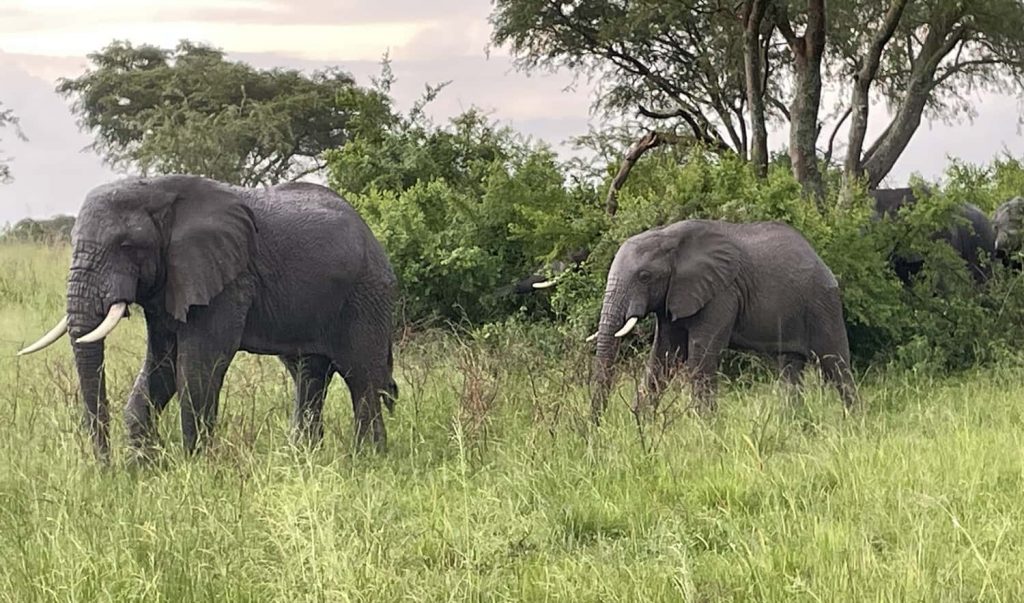
After two days at Queen Elizabeth National Park, we said an emotional farewell to our staff and headed farther West, to the Bwindi Impenetrable Forest, which borders both Rwanda and the DRC. This is truly one of Uganda’s most iconic experiences: to trek in the Forest to see the endangered mountain gorillas. This experience is nothing like I have ever had before. After a 45-minute health and safety orientation, we embarked on a trek through the dense jungle, guided by expert rangers and men with machetes cutting the paths for us! Witnessing these magnificent creatures in their natural habitat is an awe-inspiring moment that I will never forget.
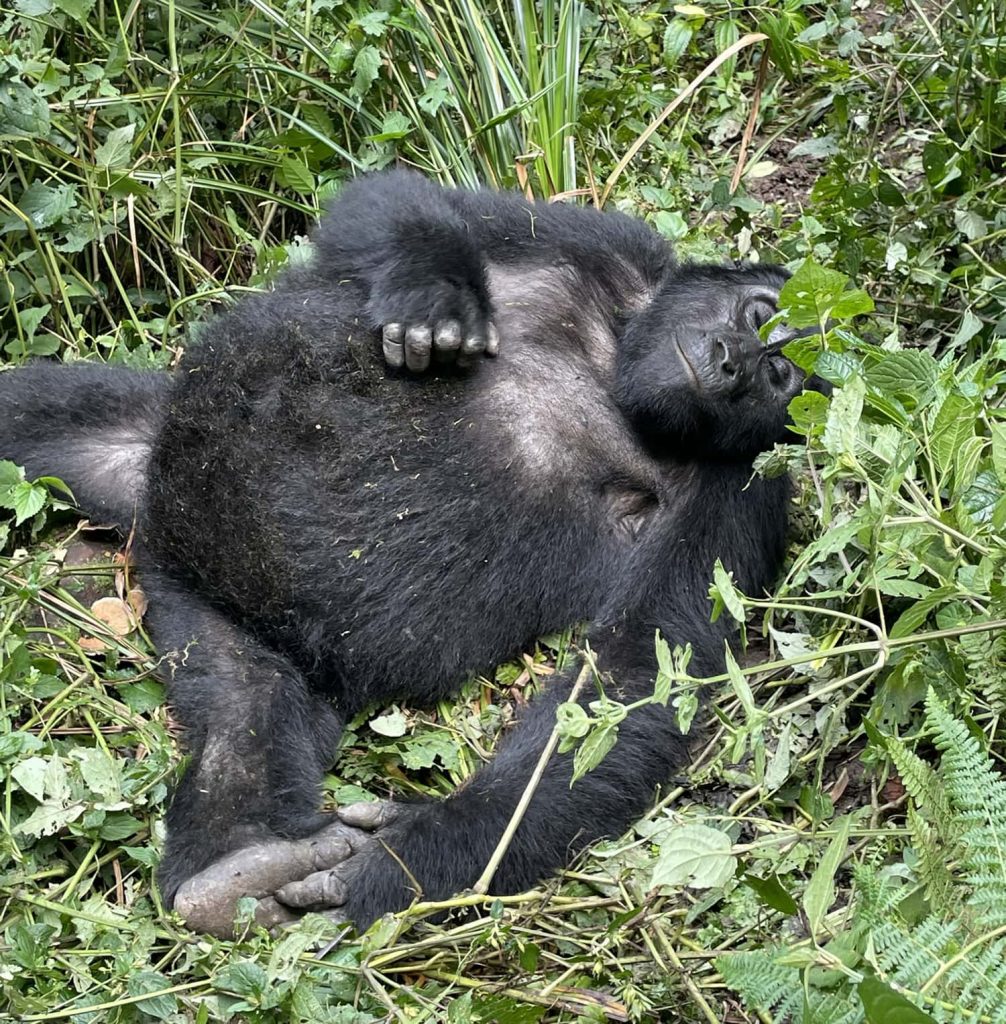
Back in Kampala, I ventured out on my own amazing day tour of Kampala! Starting with the Baha’i Temple, which is situated on the most exquisite grounds. Every religion is represented in Kampala because the kings of Baganda wanted to be inclusive. Next, Gadaffi (yes, that one) Mosque, with interior design representing African, European and Arabic culture. It is built on one of the original seven hills of Kampala and was a gift to the Ugandan people, about 15% are Muslim. Then the Bagandan Palace and Parliament, which is called The Second Scottish Parliament. Bagandans go back to 1300 AD and are the largest ethnic group of Ugandans. In the 1970s, President Abote abolished the kingdoms in Uganda (Baganda is one of four), exiling the then King who died mysteriously. Idi Amin ousted Abote and killed hundreds of thousands of Ugandan men in a horrible torture chamber located on the then vacated Baganda palace. The current Ugandan president brought back the kingdoms and the kings, but only ceremoniously, though they have a lot of local power.
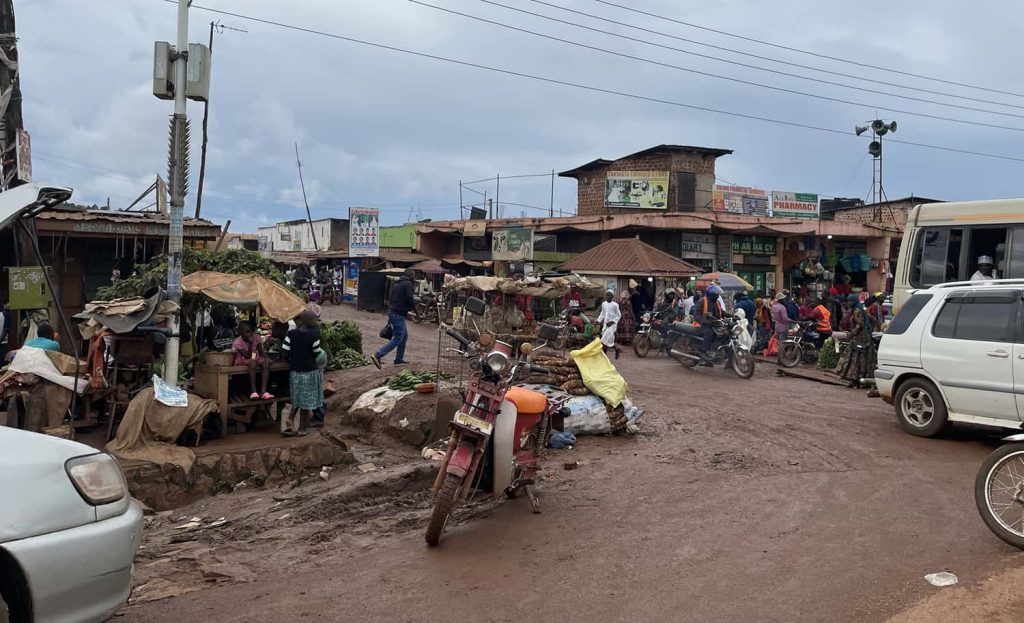
There is more that I did that I haven’t mentioned. In the end, this experience was incredible for me, my first visit to the wondrous and gorgeous and friendly continent of Africa, will most definitely not be my last! I met people there who I am still in contact with, have created some new connections to continue doing some Photovoice research there, and am anticipating a trip back some day soon.
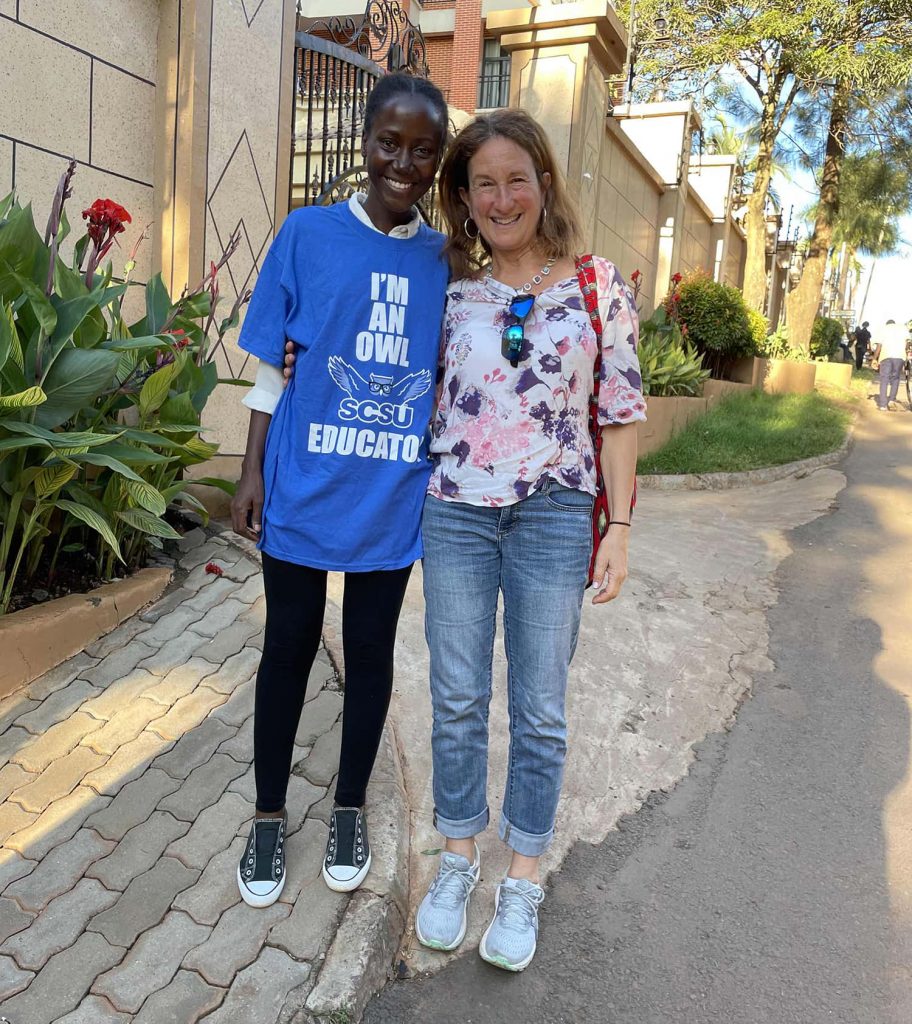
Following is a Q&A with Breny regarding her trip to Uganda.
Why did you go to Uganda and where were you based?
My book co-author and colleague, Dr. Shannon McMorrow, was spending the academic year in Uganda with her family and invited me to visit. She was doing a Fulbright Grant using Photovoice research (which is what our book is about) and she invited to do a guest lecture with her where she was stationed, at the School of Public Health at Makarere University in Kampala. I stayed with her in Kampala, which is the capital city. I spent most of my time in the capital city of Kampala, but we traveled for 5 days visiting both Queen Elizabeth Park and the Bwindi Impenetrable Forest.
What are the challenges that Uganda faces in its public health system?
What is first very obvious is a lack of infrastructure for transportation; the roads everywhere are absolutely terrible! And, everyone I met complained about it. It’s hard to describe, the roads are dirt and so the potholes are muddy and very big. While I was there, there was a social media campaign going on to bring awareness to the issue, where people would submit pictures of extreme pothole issues. The other issue I can speak to from my experience earlier this year, is the lack of health care staffing, supplies, and facilities available to the citizens of Uganda. Their public health/medical system is government funded and a lot of that funding is from NGOs and other governments, like the United States. We visited a public hospital, and it was very dire. There needed to be many upgrades, there were wards where several patients were together in one large room as private rooms were very expensive. Patients do not have access to food or meals from the hospital, instead family members bring food to patients. Confounding this of course, is that the hospitals are located in the cities and so those living in the rural areas must travel very far to visit family members.
A major public health issue are vehicle accidents caused by and to boda boda drivers. Boda bodas are small motorcycles that almost everyone drives. And, because of the poor road construction, there are a lot of accidents, some even deadly.
Do traditional forms of medicine still have a role to play in the Ugandan public health system?
I didn’t experience much of this at all and it seems as though the medical students are trained in a Western system. The Kingdom of Buganda was placed under British rule in 1894, and much of their institutional structures remain very Western. In 1971, Britain granted independence to Uganda and now the dozens of tribes of the country have some of their power back, where I would imagine traditional forms of medicine play a role alongside Western treatments.
What did people most want to know about public health in America?
Honestly, I don’t think anyone asked me about that! 😊 Most people I met, while a tourist and while lecturing, really wanted to talk to me about their country. Their pride in Uganda was beautiful. Tourism is relatively new and everyone we met had been formally trained in the new travel and tourism college degree programs around the country.
What are some lessons from Southern that can be applied to public health in Uganda?
Honestly, their public health academic programs are very solid. I think that they know what they need for their country’s public health infrastructure, but their government isn’t willing to invest the money into what is needed. Also, I don’t know if the funding is there for that kind of thing. The students we lectured were very interested in doing research, and many of them focus on areas of health equity similar to what we focus on in the U.S.
I will say that there is a lot that we can learn from them! Their commitment to sustainability was impressive! They grow everything they need to to live on, including coffee, tea, etc. And, the students we met were very concerned about, and conducting research on, climate change’s impact on human health. This makes perfect sense because of their strong connection to the lands they live on.
Has democracy fully taken hold in a country that for many years was ruled by despots?
I don’t think entirely, and again, I didn’t talk much about politics with the people I met. I did hear that they are unhappy with President Museveni, who has been in power for 40 years and word has it, he wants his son to succeed him. Truth be told, the people I spoke with don’t think they have fair elections, but they don’t talk about that.
Also while I was there, the 2023 Anti-Homosexuality Law was being discussed and was signed into law at the end of May, by President Museveni, which is a horrific and deadly law – very extremely anti-gay law.
What are the main takeaways from your visit?
My lifelong dream of getting to Africa finally came true and it did not disappoint! Despite it being a third-world country, Uganda is way ahead of us in many ways. Their focus on sustainability and addressing climate change, commitment to people with HIV, maternal mortality, and period poverty far outweighs our support, and the people and the country are simply marvelous. The food is delicious, the culture rich, and their pride is palpable. I am hopeful to be able to return to Uganda, or any other African country as soon as I can.

